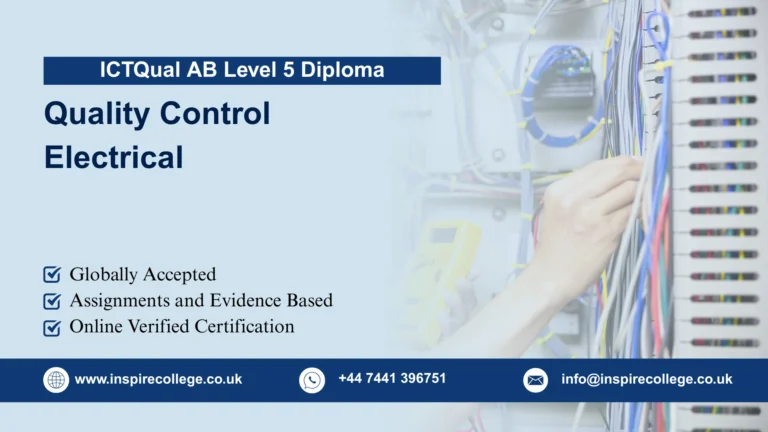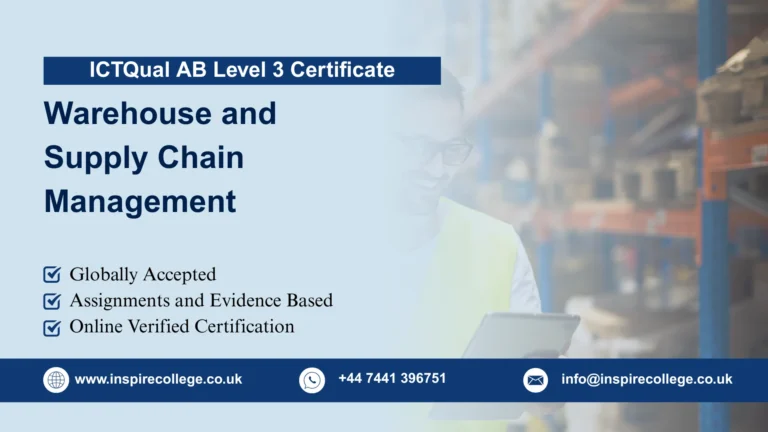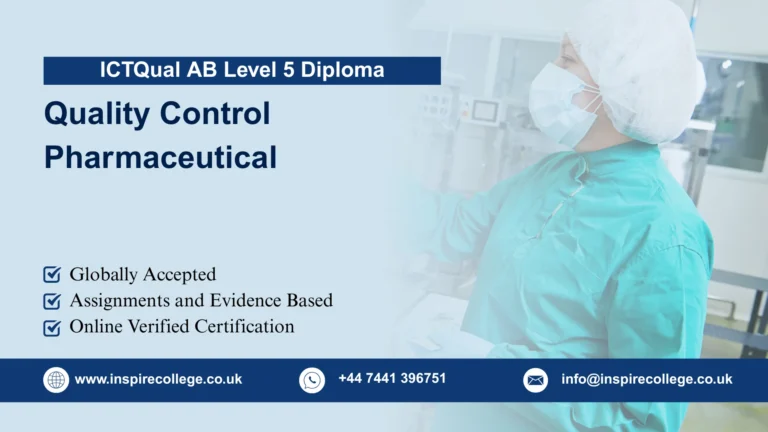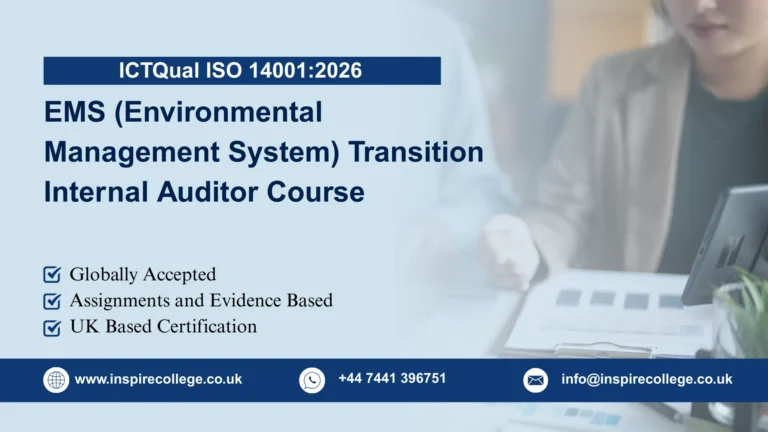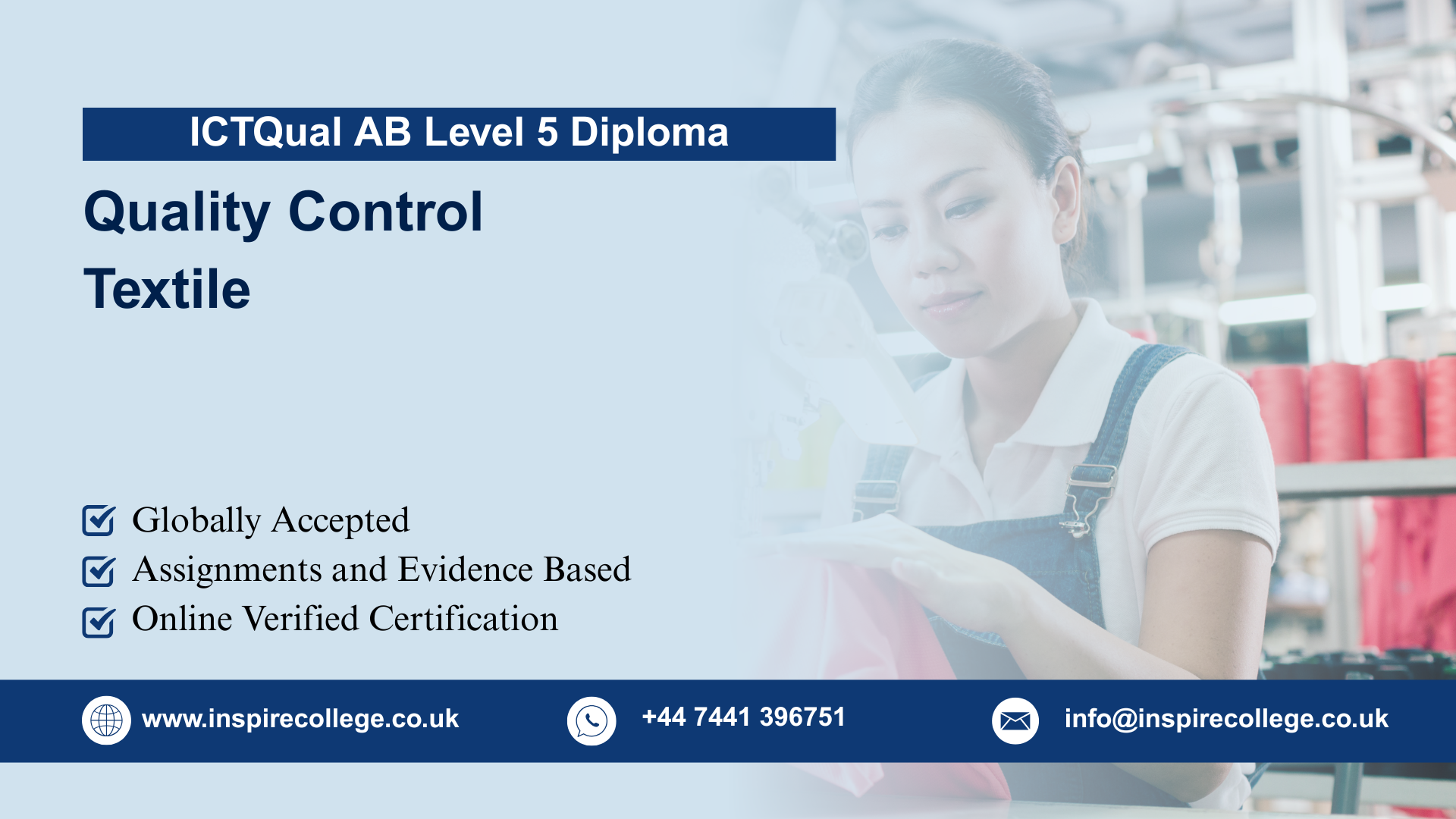
ICTQual AB Level 5 Diploma in Quality Control Textile
In the ever-evolving global textile industry, maintaining high standards of quality, safety, and compliance is essential. Manufacturers, exporters, and fashion brands increasingly demand skilled professionals who can ensure that fabrics and finished products meet strict technical and regulatory specifications. The ICTQual AB Level 5 Diploma in Quality Control Textile is a globally recognised qualification designed to equip learners with advanced knowledge in quality assurance practices specific to the textile and garment sector.
Whether you’re an experienced industry professional or looking to progress into a specialised quality management role, this diploma provides the essential expertise needed to excel in textile production and quality control environments.
The ICTQual AB Level 5 Diploma in Quality Control Textile focuses on advanced quality control systems, international compliance standards, textile testing methods, and defect analysis. The course covers the complete production cycle—from raw material inspection to finished product quality verification—enabling learners to confidently manage quality operations in textile mills, apparel manufacturing units, and export houses.
The ICTQual AB Level 5 Diploma in Quality Control Textile is a powerful qualification that bridges the gap between textile production and global quality expectations. With comprehensive modules, industry-aligned content, and real-world applications, this diploma empowers learners to lead quality initiatives and ensure that textile products meet the highest standards of safety, durability, and customer satisfaction.
If you’re looking to make a meaningful impact in the textile industry through specialised quality control skills, this diploma is the next step in your professional journey.
To enrol in the ICTQual AB Level 5 Diploma in Quality Control Textile, applicants must meet the following criteria:
- Minimum Age: Learners must be 19 years of age or older at the time of enrolment to ensure the maturity and readiness required for advanced vocational study.
- Educational Background:
- A Level 3 Diploma in Textile Technology, Garment Manufacturing, Quality Control, or a related field;
OR - A Higher Secondary School Certificate (Intermediate / A-Level or equivalent) accompanied by a demonstrated vocational interest in textiles or quality assurance.
- A Level 3 Diploma in Textile Technology, Garment Manufacturing, Quality Control, or a related field;
- Work Experience: A minimum of 2 years’ relevant experience in the textile or garment industry is required. This may include roles in quality control (QC), quality assurance (QA), production, inspection, or compliance.
- English Language Proficiency: As the course content and assessments are delivered in English, applicants must possess a strong command of written and spoken English to engage effectively with technical materials.
- Basic IT Skills: Familiarity with basic computer applications—such as word processing, spreadsheets, and report generation—is recommended to support documentation and digital quality reporting tasks.
Mandatory Units
This qualification, the ICTQual AB Level 5 Diploma in Quality Control Textile, consists of 10 mandatory units.
Mandatory Units
- Quality Management Systems (QMS) in Textile Industry
- Technical Textile and Functional Fabric Evaluation
- Advanced Colourfastness and Dye Quality Control
- Supplier and Vendor Quality Assurance
- Product Lifecycle and Quality Integration
- Risk-Based Thinking in Textile QC
- Quality Costing and Resource Planning
- International Standards and Regulatory Compliance
- Research Project in Textile Quality Control
- Leadership and Strategic Quality Planning
Learning Outcomes for the Study Units:
1. Quality Management Systems (QMS) in Textile Industry
By the end of this unit, learners will be able to:
- Understand the principles and structure of Quality Management Systems (QMS) in textile operations.
- Design and implement QMS frameworks aligned with ISO 9001 and industry-specific standards.
- Monitor, evaluate, and improve quality processes within textile production and finishing units.
- Conduct internal quality audits and management reviews.
- Promote a culture of continuous improvement through quality policies and objectives.
2. Technical Textile and Functional Fabric Evaluation
By the end of this unit, learners will be able to:
- Identify and classify technical textiles and functional fabrics based on end-use performance.
- Apply advanced testing methods to evaluate fire resistance, water repellency, breathability, UV resistance, and antimicrobial properties.
- Analyze the impact of fabric structure and treatment on functional performance.
- Interpret test results for compliance with industry and client-specific standards.
- Recommend improvements in design or process to meet functional quality requirements.
3. Advanced Colourfastness and Dye Quality Control
By the end of this unit, learners will be able to:
- Evaluate dyeing processes and colourfastness properties (e.g. to washing, light, rubbing, perspiration).
- Identify root causes of dyeing defects such as shade variation, patchiness, and bleeding.
- Apply control measures to maintain colour consistency and batch-to-batch reliability.
- Use spectrophotometers and other colour evaluation tools for precision colour matching.
- Document and report colourfastness testing in alignment with international standards.
4. Supplier and Vendor Quality Assurance
By the end of this unit, learners will be able to:
- Develop criteria for evaluating and approving textile suppliers and vendors.
- Implement supplier quality audits and performance monitoring systems.
- Establish supplier quality agreements and compliance protocols.
- Apply corrective and preventive actions (CAPA) based on supplier non-conformance reports.
- Foster collaborative relationships to ensure supply chain quality and reliability.
5. Product Lifecycle and Quality Integration
By the end of this unit, learners will be able to:
- Understand the stages of the textile product lifecycle from concept to disposal.
- Integrate quality control checkpoints into design, development, production, and after-sales stages.
- Apply lifecycle thinking to minimize defects and ensure sustainability.
- Coordinate cross-functional teams to align quality objectives with business strategy.
- Use lifecycle data for continual quality improvement.
6. Risk-Based Thinking in Textile Quality Control
By the end of this unit, learners will be able to:
- Apply risk-based thinking in identifying potential quality failures and hazards.
- Use risk assessment tools such as FMEA (Failure Modes and Effects Analysis) and cause-and-effect diagrams.
- Prioritize risks and implement appropriate mitigation and monitoring strategies.
- Develop contingency plans to address supply, process, or quality disruptions.
- Incorporate risk-based decision-making into everyday quality control operations.
7. Quality Costing and Resource Planning
By the end of this unit, learners will be able to:
- Understand the components of quality costs: prevention, appraisal, internal failure, and external failure.
- Analyze and interpret cost of quality (CoQ) reports to identify improvement opportunities.
- Allocate quality resources efficiently to balance cost and performance.
- Plan budgets for quality assurance functions and investment in testing infrastructure.
- Advocate for quality improvement initiatives through cost-benefit analysis.
8. International Standards and Regulatory Compliance
By the end of this unit, learners will be able to:
- Interpret international standards relevant to textiles (e.g. ISO, AATCC, ASTM, OEKO-TEX, GOTS).
- Ensure compliance with health, safety, environmental, and ethical sourcing regulations.
- Prepare for external audits and certifications.
- Manage documentation and traceability systems for regulatory reporting.
- Promote ethical and sustainable practices across the supply chain.
9. Research Project in Textile Quality Control
By the end of this unit, learners will be able to:
- Identify and define a relevant research problem in textile quality control.
- Conduct a literature review and develop a structured research proposal.
- Collect, analyze, and interpret data using appropriate methodologies.
- Present research findings with clarity, accuracy, and academic rigor.
- Formulate practical recommendations for quality improvement based on evidence.
10. Leadership and Strategic Quality Planning
By the end of this unit, learners will be able to:
- Demonstrate leadership skills in driving quality initiatives within textile organizations.
- Develop and implement strategic quality plans aligned with business goals.
- Inspire and manage cross-functional quality teams to achieve KPIs.
- Use performance metrics and benchmarking to measure quality success.
- Lead organizational change efforts to foster a culture of quality excellence.
The ICTQual AB Level 5 Diploma in Quality Control Textile is specifically designed for individuals aiming to advance their careers in the textile and garment industry by specialising in quality control, compliance, and production standards. This diploma is ideal for:
- Quality Control and Quality Assurance Professionals
Individuals currently working in QC/QA departments of textile mills, garment factories, or export houses who wish to deepen their expertise and move into supervisory or managerial roles. - Textile and Garment Technicians
Technicians involved in fabric inspection, testing, and process control seeking to enhance their theoretical and practical understanding of quality systems. - Production Supervisors and Line Managers
Those overseeing manufacturing processes who need to integrate quality assurance measures and reduce defects in production lines. - Compliance and Audit Personnel
Professionals responsible for ensuring conformity to international standards, buyer specifications, and environmental regulations. - Graduates and Diploma Holders in Textile or Fashion Disciplines
Individuals who have completed prior education in textile technology, fashion design, or industrial production and wish to specialise in quality assurance. - Career Changers and Entrepreneurs
Those entering the textile or apparel industry with relevant work experience, or planning to set up quality-focused textile businesses.
Whether you’re working in a local production unit or an international export facility, this diploma equips you with the skills, knowledge, and recognition needed to ensure textile products meet the highest global quality standards.
Register Now
FAQs for ICTQual AB Level 5 Diploma in Quality Control Textile


